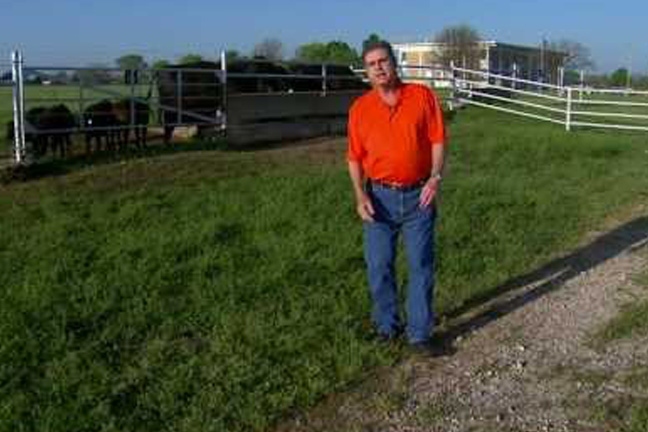
Agricultural News
Glenn Selk Talks About Protecting the Cattle Herd Following Spring Time Storms
Mon, 16 Apr 2012 14:10:36 CDT

As OSU's Glenn Selk explains in this week's Cow Calf Newsletter, cleaning up after a storm is crucial to protect livestock from injury and illness. He offers several suggestions adapted from D.W. Smith, an Extension Safety Program Specialist at Texas A&M.
Spring time is thunderstorm season across the Plains. As we observed this past weekend, spring storms occasionally bring severe winds or even tornadoes. Cleaning up after a severe storm is difficult enough. Losing valuable cattle brings additional financial hardship to the situation. Relying on an article published by D.W. Smith,
Cattle loss can occur in several scenarios. Livestock may be killed, lost, or stolen during a stormy situation. An accurate accounting of livestock and property is essential to a cattle operation's storm preparedness. Keep a CURRENT inventory of all animals and the pastures where they are located. Individual animal ID tags on all animals have several other purposes, but can become extremely valuable if cattle become scattered or even stolen. If these records are computer based, consider having a "back-up" copy stored at a neighbor's or a relative's house.
The Texas A&M Extension Disaster Education Network has an excellent fact sheet by David W. Smith (Extension Safety Program Specialist) on farmstead preparedness and care after a storm. It can be found on line by clicking here.
A few of their suggestions for protecting cattle from the aftermath of storms include:
1. Gather and dispose of trash, limbs, wire, and damaged equipment that could harm livestock. Clear and repair damaged fences.
2. Make sure livestock have plenty of water and food that have not been contaminated by pollutants. In some cases, it is necessary to truck in water and food, or to remove livestock from contaminated areas.
3. Properly and immediately dispose of dead carcasses. If rendering plants are still available in your area, they may process some dead animals. Those not processed should be buried away from water bodies at least 3 to 4 feet deep and covered with quick-lime to accelerate decomposition.
4. Observe livestock for signs of infectious disease such as pneumonia or foot rot. All animals that die immediately following a disaster should be necropsied by a veterinarian.
5. Spray livestock with insect repellent in case of floods to protect against mosquitoes that may carry disease.
There are other things to consider when clearing the storm debris. Be mindful of such things as fiberglass insulation that is often scattered across pastures. Gather as much of the big pieces as possible so that cattle do not consume large amounts of the insulation. Also plastic bags may be ingested by cattle and cause compacted intestinal tracts. Avoid junk or debris that could be a source of lead. (This could really be an issue after a severe thunderstorm or tornado with wind damage which results in roofing debris spread across the pasture.) DO NOT allow cattle access to pastures where old car batteries or sources of crank case oil (old abandoned vehicles or machines) may cause lead poisoning.
WebReadyTM Powered by WireReady® NSI
Top Agricultural News
More Headlines...




















